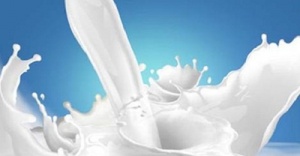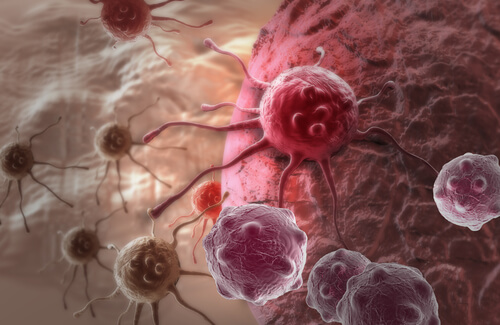Diseases Related to Drinking Cow's Milk

Recent studies have thrown into doubt the supposed healthiness of drinking cow’s milk. Unlike we previously thought, drinking too much of it can actually worsen your health and cause disease. Learn more about it below.
Why is drinking cow’s milk bad for your health?
Many people wonder how it could be that drinking cow’s milk is bad for your health if we’ve been doing it for centuries.
To answer this, we have to go back in time a little bit, to around the 1960s, when they started to artificially modify the natural growth of cows. Studies show that in the 1800’s, cows started to produce around 9 liters of milk a day.
Nowadays, with new techniques for artificial animal growth — for example, antibiotics, genetic selection, change in diet, growth hormones — we’ve gotten cows to start producing up to 24 liters a day. It’s fascinating to see how cows went from producing 2 liters of milk to 24 or more a day.
The artificial growth techniques have been great for the dairy and meat industries. But the truth is that this departure from what’s natural has consequences that for people who drink it. This is because milk is affected by things like how the animal is raised, antibiotics, hormones, diet, etc. Based on these things, it can cause various health issues over the years.
There are also many studies that have been done over the years on the impact of cow’s milk, to see how it affects people’s health. Harvard University recently did a study showing that there’s a relationship between excessively drinking cow’s milk and developing specific diseases.
You might like: The Benefits of Vegetable Milks and How to Prepare Them
Migraine

Studies showed that patients who suffer from migraines had a noticeable reduction in symptoms after they stopped drinking cow’s milk.
Constipation
Lactose intolerance has a link to constipation in children and mature adults. Taking cows’ milk out of your diet and increasing your fruits, vegetables, and fiber intake is a good solution to this problem.
Cancer

The presence of hormones and other substances in cow’s milk also has a link to the development of different types of cancer like stomach, breast, ovarian, prostate, lung, and testicular cancer.
Cataracts
Studies have also shown that people who drink a lot of cow’s milk or its derivatives get more cataracts than people who don’t. This problem has to do with lactose and galactose, which mainly affects females.
Chronic fatigue

A study done on children in 1991 in Rochester, New York, showed that drinking cow’s milk increased the risk of chronic fatigue by 44.3%.
Allergic reactions
Allergies to the proteins in cow’s milk are part of a defense mechanism in the immune system. Studies have shown that the allergic reaction can also be immediate. In other words, it can happen in under than 45 minutes, after a few hours, or after a few days.
Gastrointestinal bleeding
This happens because of intolerance to the proteins in cow’s milk, and it’s most common in children. Some studies say it might also be one of the most common causes of anemia in children.
17 other diseases related to cow’s milk
- Rheumatoid arthritis and osteoarthritis
- Asthma
- Autism
- Ulcerative colitis
- Irritable bowel syndrome
- Type I diabetes
- Abdominal pain
- Crohn’s disease
- Heart disease
- Multiple sclerosis
- Fistulas or anal fissures
- Urinary incontinence
- Lactose intolerance
- Lymphomas
- Malabsorption syndrome
- Sleep disorders
- Peptic ulcers
All cited sources were thoroughly reviewed by our team to ensure their quality, reliability, currency, and validity. The bibliography of this article was considered reliable and of academic or scientific accuracy.
- Administración de Alimentos y Medicamentos de Estados Unidos (2019). Bovine Somatotropin (BST). Available at: https://www.fda.gov/animal-veterinary/product-safety-information/bovine-somatotropin-bst. Accessed 16/03/2020.
- Centros para el Control y Prevención de Enfermedades (2019). Leche cruda (sin pasteurizar). Available at: https://www.cdc.gov/spanish/especialescdc/lechecruda/index.html. Accessed 16/03/2020.
- Comisión Europea (2014). Seguridad alimentaria. Available at: https://europa.eu/european-union/file/1294/download_es?token=7-rmWup9. Accessed 16/03/2020.
- Daher, S., Tahan, S., Solé, D., Naspitz, C. K., Da Silva Patrício, F. R., Neto, U. F., & De Morais, M. B. (2001). Cow’s milk protein intolerance and chronic constipation in children. Pediatric allergy and immunology, 12(6), 339-342. Available at: https://doi.org/10.1034/j.1399-3038.2001.0o057.x. Accessed 16/03/2020.
- Mayo Clinic (2018). Alergia a la leche: síntomas y causas. Available at: https://www.mayoclinic.org/es-es/diseases-conditions/milk-allergy/symptoms-causes/syc-20375101. Accessed 16/03/2020.
- Mayo Clinic (2018). Cataratas: síntomas y causas. Available at: https://www.mayoclinic.org/es-es/diseases-conditions/cataracts/symptoms-causes/syc-20353790. Accessed 16/03/2020.
- Mayo Clinic (2018). Intolerancia a la lactosa. Available at: https://www.mayoclinic.org/es-es/diseases-conditions/lactose-intolerance/symptoms-causes/syc-20374232. Accessed 16/03/2020.
- Mayo Clinic (2020). Migraña: síntomas y causas. Available at: https://www.mayoclinic.org/es-es/diseases-conditions/migraine-headache/symptoms-causes/syc-20360201. Accessed 16/03/2020.
- Rowe, P. C., Marden, C. L., Jasion, S. E., Cranston, E. M., Flaherty, M. A., & Kelly, K. J. (2016). Cow’s milk protein intolerance in adolescents and young adults with chronic fatigue syndrome. Acta Paediatrica, 105(9), e412-e418. Available at: https://doi.org/10.1111/apa.13476. Accessed 16/03/2020.
This text is provided for informational purposes only and does not replace consultation with a professional. If in doubt, consult your specialist.








